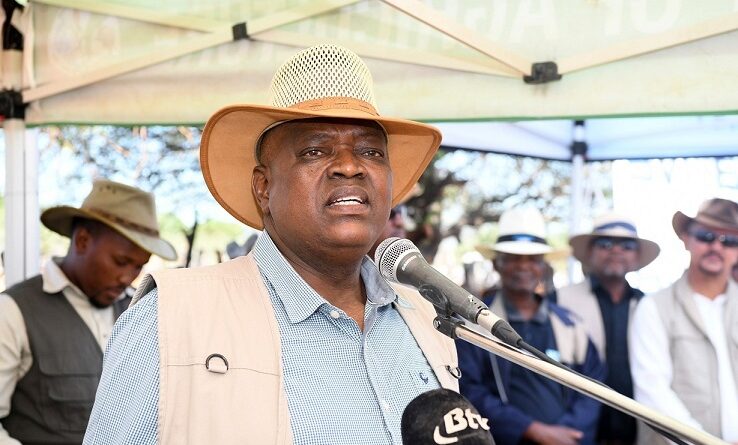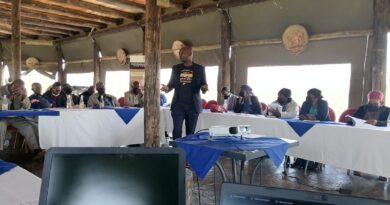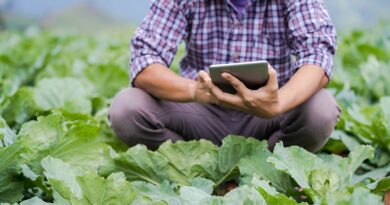The President, Dr. M.E.K. Masisi delivers annual State of the Nation Address at the 1st Meeting of the 3rd Session of the 12th Parliament
On 14th November, the president of the Republic of Botswana gave a state of the nation address to update the nation on challenges, successes and aspirations of his government. When it comes to agriculture, The President said that the sector continues to create more opportunities for food security, diversification of the economy and employment through the development of clusters and value chains.
He went on to acknowledge that the introduction of import restrictions on some vegetables and fruits, which was implemented some months ago to stimulate local production, provided a huge market for local farmers.
He however explained that he was aware that consumers continue to encounter challenges of under-supply and increased costs of some fruits and vegetables.
“There are at times challenges of oversupply which, while beneficial to the consumer in terms of price, negatively affect the producer. As the market matures, this will stabilise.” He said.
He urged Batswana across the length and breadth of the country to take advantage of the new market opportunities for local produce and expand their production and value-addition. He specifically implored wholesalers, retailers, and consumers to ensure compliance with the new policies of Government with a view to supporting and growing our farmers countrywide and, thus creating employment and putting money in many more households than before.
“We need to make up for our huge vegetable and fruit import bill and mature to export to other countries. We have spent too many years of post-colonial history of Botswana importing. It is about time we too enjoyed the benefits of exporting and earning hard foreign currency through vegetable and fruit production.” Emphasised President Masisi.
A large-scale citrus project in Selebi Phikwe started in 2020 as a result of Foreign Direct Investment. It employs over one thousand (1,000) people. For the first time, Botswana is expected to generate export revenue from high quality fruits to premium markets. To date, a total of seven hundred thousand (700,000) fruit trees have been planted and additional land is being prepared to accommodate a further three hundred thousand (300,000) trees.
Masisi noted that this investment will also enhance the economic sustainability of the Mmadinare based cooperative society. This is value chain development and diversification in action to deliver an export-led economy, which was one of his election campaign promises.
The construction of Tsabong multi-species abattoir will be commissioned in April 2023. The abattoir will give small- stock farmers an opportunity to slaughter animals for local and international markets. Furthermore, the establishment of the Meat Industry Regulatory Authority (MIRA) will be tabled at the next sitting of Parliament.
The Meat Industry Regulatory Authority will, amongst others, enhance competition in the meat sector through licensing of abattoirs, managing animal traceability, and promoting the marketing of livestock and by-products. Share on XGovernment has strategically positioned Ramatlabama National Artificial Insemination Laboratory as a centre of excellence for cattle and small stock assisted reproductive technologies. Semen harvesting technology will be used for semen processing, analysis, packaging, labelling and storage. It will also be used for embryo flushing and will thus take us away from analogue to digitilisation.
To date, two hundred and sixty thousand seven hundred and thirteen (260,713) cattle semen straws are available at the Ramatlabama Laboratory. The Laboratory is intended to grow this capacity by the millions within the next two years.
Of this number, two hundred and forty-eight thousand five hundred and thirteen (248, 513) were locally tapped while twelve thousand two hundred (12,200) cattle straws of semen were procured from abroad. The newly revised Artificial Insemination roll-out programme was launched at Dibete several weeks ago.
Additionally, the country will continue importing live animals, and the target is to have thirty (30) imported bulls and thirty (30) females by end of March 2023. This will help the country reach a total of 4.32 million semen straws per year, against the current capacity of forty thousand (40,000).
A multi-species equipment to be used for tapping and processing semen for cattle and small stock of this magnitude is being procured. Similarly, the equipment to produce embryos is being procured as well as training of the required human resources. All these initiatives are meant to improve the quality of livestock and increase the national herds. The President therefore encouraged farmers to procure semen straws to improve their herds’ genetics.
The export of live cattle is expected to continue for the next two years, subject to periodic reviews. Since the inception of this initiative, a total of over two hundred and five thousand (205 000) cattle have been sold to some neighbouring countries. This initiative was meant to relieve farmers of cash-flow challenges occasioned by COVID-19.
As part of Government efforts to revitalise the beef industry, three private abattoirs have been facilitated to export beef and beef by-products to international markets. This has increased opportunities in the beef sector.
When it comes to arable farming, he noted that although the average rainfall was good for 2021/2022 season, distribution across the country was uneven which affected yield. As such, the total production for the season reduced from one hundred thousand (100,000) tonnes to over sixty-six thousand (66,000), a represents a 34 percent decrease. This undermined the country’s ability to meet the national cereal demand, which he noted, challenged the nation to rethink its food production strategies.
Due to operational challenges, Temo-Letlotlo programme which is to replace the ISPAAD programme will now be implemented during the 2023/2024 financial year. To this end, the current ISPAAD programme will continue during the 2022/2023 ploughing season. Temo-Letlotlo is intended to improve productivity and promote commercialised arable farming.
The completion of the twelve (12) grain storage silos in Pandamatenga is in progress, although it was significantly affected in scope, cost and time by COVID-19, the project is expected to be completed by March 2023. Share on XTo further address the challenge of food insecurity, Government is implementing various interventions including: The Impact Accelerator Subsidy, which provides horticulture farmers with a 50 percent grant in an effort to optimise local production, through the National Development Bank, as well as procurement of semen straws for both sexed female dairy cattle and ordinary dairy cattle and their distribution to farmers at subsidised prices to improve local production of milk.
The Foot and Mouth Disease (FMD) outbreak incidences continue to threaten the livelihoods of farmers and cause immense emotional pain. It also negatively impacts the economy of the country. Recently, the North-East district experienced an outbreak of the Disease in Zone 6b. To relieve the burden of loss on affected communities, Government made a decision to depopulate, restock and compensate affected farmers.
“I profoundly thank Rre Benson Samson of Butale Village for alerting Government about the Foot and Mouth outbreak. Furthermore, I want to extend my sincere gratitude to all farmers for their cooperation in containing the disease. In the same vein, I commend public officers who facilitated the containment of the Foot and Mouth outbreak.” Said the President
Another challenge is the outbreak of cattle lung disease in the northern part of Namibia, which borders Ngamiland. As part of strengthening response and control measures, Veterinary Authorities of the two countries continue to conduct fence maintenance, disease surveillance and joint patrols along the common border.
“ I encourage all farmers to be vigilant as the country continues to experience outbreaks of disease variants such as, the Bovine Malignant Catarrhal Fever (Bolwetsi jwa Dikgokong) at Gasita Extension Area in the Southern District.” Said Masisi.
With a view to strengthening animal diseases management in the region, Botswana will host a regional conference on livestock diseases in February next year. The Conference will deliberate on livestock diseases and vaccine production with a view to come up with a coordinated sub-regional response strategy.
The Botswana Vaccine Institute (BVI) is expanding its plant capacity to enable product diversification through Research and Development. The facility will more than double BVI capacity to blend vaccines from the current 20 million doses to over 50 million. This will enable BVI to diversify its product offering and deepen continental production on animal health products.
Through its new organisational structure, the Institute will undertake targeted research and development towards new products to supply the SADC region, East and West Africa and other targeted markets by 2025.



